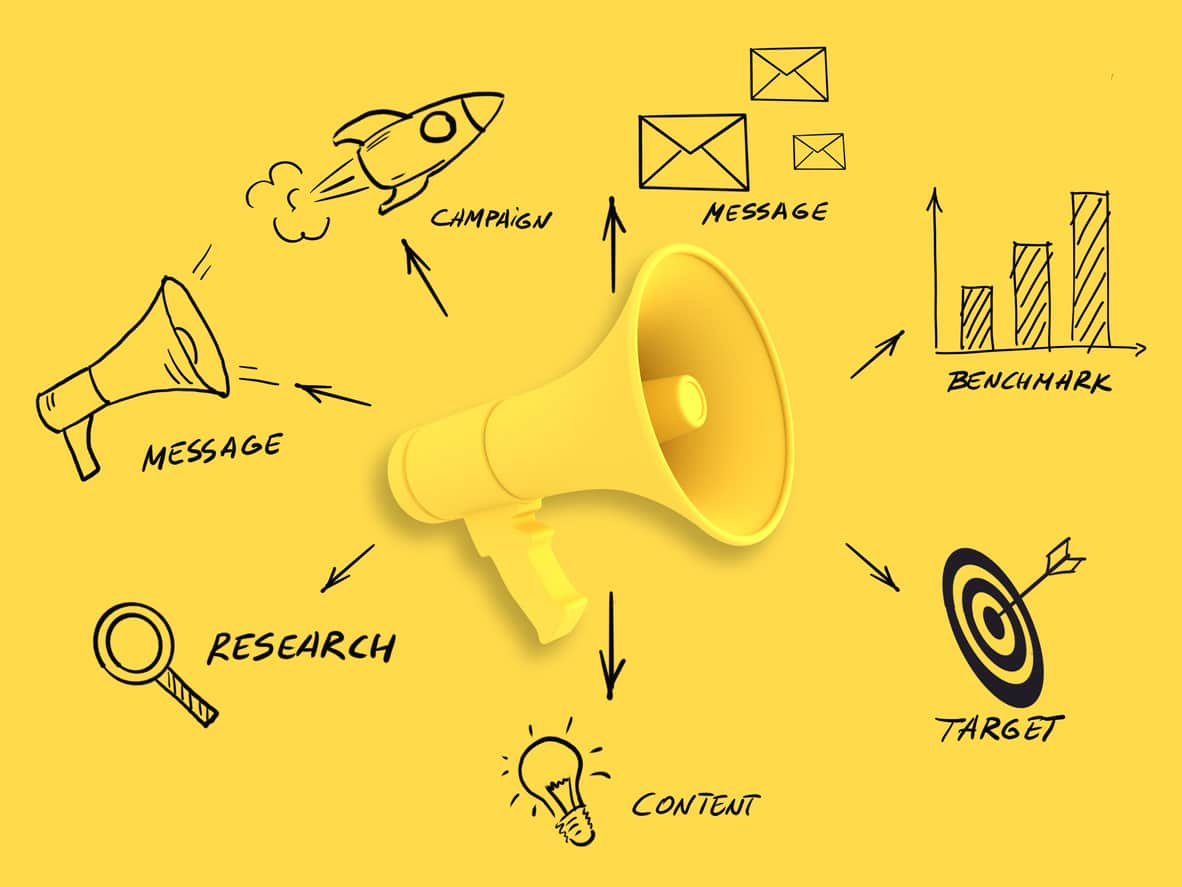Starting a career in Digital Marketing is a great decision. With or without prior experience, it is never too late to enter the dynamic field of online marketing. You do not need to attend a college or university for a digital marketing course, as plenty of resources are available online to acquire the necessary skills. Additionally, you can even work with clients globally from the comfort of your own home.
What is Digital Marketing?
Digital marketing is the process of promoting products, services, or brands through digital channels such as search engines, social media, websites, email, and mobile apps. It encompasses a wide range of tactics and techniques, including search engine optimization (SEO), pay-per-click (PPC) advertising, social media marketing, content marketing, influencer marketing, email marketing, and more. The goal of digital marketing is to reach and engage with customers through digital channels in order to drive conversions and sales and ultimately grow a business.
The Skills You Need to Get Hired as a Digital Marketer
To be hired as a digital marketer, it is important to have a combination of technical and soft skills. Some of the key skills that are typically required for digital marketing positions include
- Search Engine Optimization (SEO): Understanding how search engines work and how to optimize websites and content for search engines.
- Pay-Per-Click (PPC) Advertising: Knowledge of creating and managing pay-per-click advertising campaigns on platforms such as Google Ads and Bing Ads.
- Social Media Marketing: Understanding how to create, manage, and optimize social media marketing campaigns on platforms like Facebook, Instagram, Twitter, and LinkedIn.
- Content Marketing: Knowledge of how to create, distribute, and promote high-quality content that is designed to attract and engage customers.
- Email Marketing: Understanding how to create, design, and send effective email marketing campaigns.
- Analytics and Data Analysis: Knowledge of how to use tools such as Google Analytics and Adobe Analytics to track and analyze the website and campaign performance.
- Design: Understanding of design principles, graphic design software, and tools like Adobe Illustrator, Canva, etc.
- Leadership: the ability to lead and manage a team.
- Strong Writing: Ability to write clear, persuasive, and engaging copy.
- Adaptability: the ability to adapt to new technologies and trends in the digital marketing industry.
- Project Management: the ability to create, manage and execute projects promptly and efficiently.
- Strong Communication and Interpersonal Skills: the ability to communicate effectively with clients, team members, and stakeholders.
- Strategic Thinking: the ability to think strategically and make data-driven decisions.
- Creativity: the ability to develop new and innovative ideas for digital marketing campaigns and strategies.
- Technical skills: familiarize with website development, coding, and web analytics tools.
Having a solid understanding of these skills and the ability to demonstrate them through a portfolio and relevant work experience can greatly increase your chances of getting hired as a digital marketer.
To understand better, take Digital Marketing Quiz.
Digital Marketing Tools in 2025
The Marketing Tools You Should Know How to Use
- Google Analytics: A web analytics tool that tracks and reports website traffic and user behavior.
- Google Ads: A pay-per-click advertising platform that allows businesses to display ads on Google search results and other websites.
- SEMrush: A digital marketing tool that provides insights on SEO, PPC, content marketing, and social media.
- Ahrefs: A tool that allows you to monitor your website's backlinks, research keywords, and analyze your competition.
- MailChimp: An email marketing platform that allows you to create, send, and track email campaigns.
- Salesforce: A customer relationship management (CRM) platform that allows you to manage leads, contacts, and sales.
- Hubspot: An all-in-one marketing, sales, and service platform that allows you to create and optimize content, manage leads, and track performance.
- Canva: A graphic design tool that allows you to create visually appealing designs for social media, email, and other marketing materials.
- Hootsuite: A social media management tool that allows you to schedule and publish content, monitor mentions, and track performance across multiple social media platforms.
- Facebook Ads Manager: A tool for creating, managing, and tracking the performance of Facebook ads.
- Instagram Insights: A built-in analytics tool for Instagram accounts that allow you to track engagement, reach, and audience growth.
- Twitter Analytics: A built-in analytics tool for Twitter accounts that allows you to track engagement, reach, and audience growth.
- LinkedIn Ads: A platform for creating and managing LinkedIn ads.
- Marketing Automation tools: tools like Marketo, Pardot, and Eloqua allow you to automate repetitive marketing tasks such as email campaigns, lead scoring, and lead nurturing.
- Adobe Creative Suite: A set of graphic design and video editing tools, including Photoshop, Illustrator, and Premiere Pro.
Where to Learn Digital Marketing Skills?
You can gain knowledge of digital marketing skills through free online courses, such as the Great Learning Academy, Moz SEO guide, and tutorials offered by Hubspot. It is also important to stay updated with the latest marketing trends and developments as the field constantly evolves. If you want to make a career change and learn all the necessary techniques quickly, consider taking the best digital marketing course that covers everything required to start working as a digital marketer.
How to Become a Digital Marketer in Five Steps?
- Learn digital marketing fundamentals
- Learn how to use key digital marketing tools
- Work on digital marketing projects
- Work on Improving your digital marketing resume
- Network to make connections in marketing
Learn digital marketing fundamentals
To start a career in digital marketing, it's important to understand fundamental concepts such as SEO, SEM, analytics, social media marketing, advertising, and email marketing. Additionally, it's beneficial to develop soft skills like leadership, strong writing, and an understanding of the online landscape. Rather than trying to acquire these skills separately, it may be more efficient to participate in a comprehensive program, such as a great learning digital marketing course that can provide in-depth and accelerated learning.
Learn how to use key digital marketing tools
To become a successful digital marketer, having experience with key digital marketing tools is important. These tools include Google Analytics and Google Ads, which allow digital marketers to measure and track the performance of digital marketing campaigns and initiatives. SEO tools such as Ahrefs, Moz, and SEMrush are also essential, giving marketers the ability to explore relevant keywords, check backlinks to their pages, identify related keywords, and analyze competitors’ SEO.
Experience with email campaign tools such as MailChimp or SendGrid and customer relationship management (CRM) programs like Salesforce and Hubspot can also be valuable. Additionally, knowledge of social media platforms like Facebook, Twitter, Instagram, LinkedIn, TikTok, etc., and social media management tools like Hootsuite, Later, and Buffer can help you stand out when applying for a job in digital marketing.
Using free stock image sites like Unsplash or Pexels and graphic design platforms like Canva or BrandCrowd to develop standout content for your social media platforms will make you a more desirable candidate.
Work on digital marketing projects
Creating a digital marketing portfolio can be challenging as it requires demonstrating your skills, processes, and outcomes in a way that showcases your teamwork, planning, and strategic thinking. To build a strong portfolio, including samples of published work such as newsletters, social media posts, or content marketing articles. Clearly indicate your role in their creation, such as developing the strategic plan, writing the copy, designing the layout, or coordinating the ad-buying campaign. Also, include data to support your claims, such as "I added 1,200 qualified leads via a targeted social media campaign in Q2 of 2020" or "I grew organic web traffic 18 percent year-over-year." If you have no work experience, you can feature the results of the hands-on exercises you conducted as part of your digital marketing coursework. It is also important to keep your online presence professional, and if you prefer to keep your social channels private, consider launching a passion project such as an Instagram account for sharing your photography or a blog dedicated to cooking and recipes and include it in your portfolio as well. Be sure to obtain the client's consent before sharing any proprietary information.
Work on Improving your digital marketing resume
When creating a resume for a digital marketing role, it is important to keep it simple and use bullet points where appropriate. The focus should be on your marketing skills and experience, and including hard numbers can be helpful. It is also important to tailor your resume to each job application by matching the tone of the job posting and the company's online presence. Your resume should showcase your personality and creativity in a way that aligns with the company's brand. Your skills should be divided into three categories: marketing skills (including software skills and other technical requirements), transferable skills (such as sales, design-savvy, or writing experience), and adaptable skills (like leadership or problem-solving). Emphasize your marketing skills first, then your transferable and adaptive skills. Remember to keep your resume clean and concise.
Coming to an End…
To become an expert in digital marketing, it is essential to continuously learn and stay up-to-date with the latest trends and developments in the field. This can be achieved by reading books, listening to podcasts, watching videos, and following industry leaders. Additionally, networking is crucial as it can provide exposure to new career opportunities and help you gain insights from individuals with diverse perspectives, which can help you excel in your career. Remember that no one has all the answers, so always be open to learning from others.





